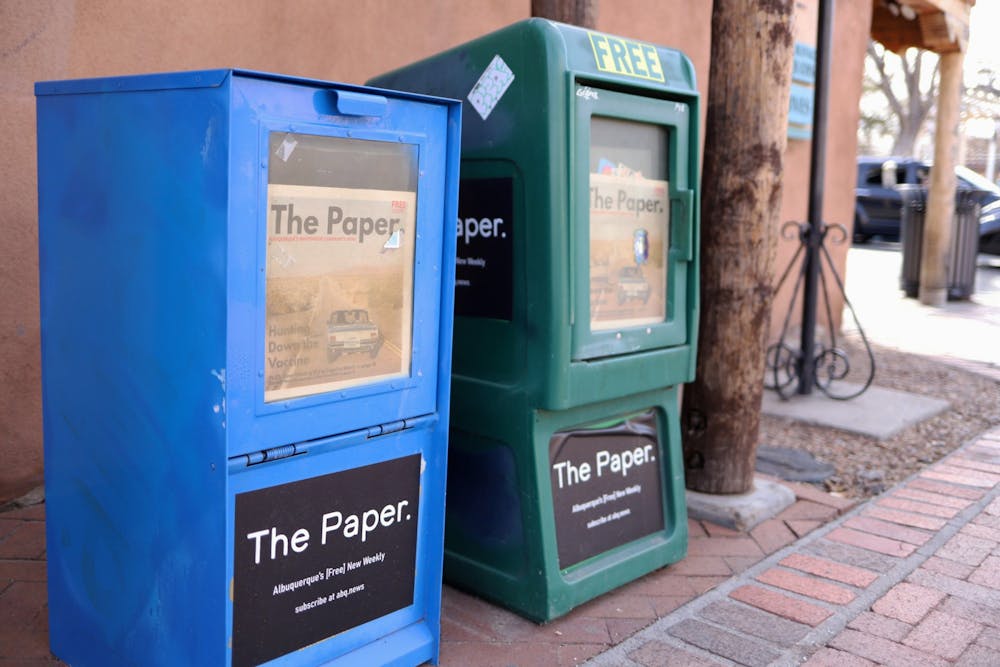On Feb. 18, Albuquerque’s newly minted alt-weekly The Paper published a “Being Black in NM'' special issue for Black History Month. The issue was intended to be a space to highlight Black voices, but featured a full-page advertisement from the R.J. Reynolds Tobacco Company.
“This week, we asked our regular journalists and contributors to take a step back and give their space to Black writers, organizers and businesses to share their perspective on being Black in New Mexico,” the introduction to the special edition said.
However, the issue featured a full page ad for R.J. Reynold’s Lucky Cigarettes, which has a legacy of being sued for participating in mass genocide because of the company’s historic involvement with the slave trade.
The lawsuit said the company and its subsidiaries “were unjustly enriched through the profits they earned either directly or indirectly from the trans-Atlantic slave trade and slavery.”
Tierna Unruh-Enos, the managing editor of The Paper, said the alt-weekly hadn’t considered that element of the company before publishing their advertisement in the special issue.
“No, you know, I mean, I hadn't thought of that,” Unruh-Enos said.
Brandale Mills, a multicultural market researcher and founder of the Bernalillo-based Inclusive Market Research Group, spoke to the Daily Lobo about how, in light of uprisings for social and racial justice over the summer, it’s important to hold everyone accountable.
“It's no longer acceptable to act without really knowing that history and understanding the history of a product or an industry, before you place an ad in your publication,” Mills said. “I think it's our responsibility now to go a step further and really understand how that placement might impact communities of color.”
While Mills did acknowledge that it may have been unintentional, she also said ignorance isn’t an excuse.
“The individuals at the publication may have genuinely just not known, but not knowing is no longer an excuse,” Mills said.
Unruh-Enos said The Paper’s contract with the tobacco manufacturing company required the alt-weekly to place the ad in every issue, and it would have been nearly impossible to pull the ad for one publication.
“The company (gave) us a contract in December, and they say, ‘These are the weeks throughout the entire year that we want to run.’ They're not basing it on our editorial content, because they don't know what it’s going to be,” Unruh-Enos said.
Get content from The Daily Lobo delivered to your inbox
Others questioned the ethics of advertising for cigarettes, a cancer-causing product, in the first place.
John Benavidez, a professor at the Anderson School of Management at the University of New Mexico, said the advertisement of tobacco products comes down to individual ethics.
“That's just an easy argument to make: ‘You know, we're just doing a service. We're just promoting the product; it's not our product,’” Benavidez said. “I think it all comes down to personal ethics. For me, I personally wouldn't feel comfortable marketing that type of product.”
According to the American Cancer Society, “African Americans in the U.S. still have the highest death rate and lowest survival rate of any racial or ethnic group for most cancers.”
Lung cancers are the second most commonly diagnosed cancers in both Black men and women in the U.S., according to the American Cancer Society. The health organization said 202,260 new cancer cases and 73,030 cancer deaths were expected in the Black community in the U.S. in 2019.
Mills also said it has become increasingly difficult to separate media outlets from the organizations that they advertise for.
“Historically, we know that there's been a separation in terms of the values of the paper, and the values of the institutions or corporations of the ads that they're running,” Mills said. “But I think now we're in a time where you can no longer afford to separate the two.”
Benavidez made the opposing case that it’s not the media outlet’s responsibility to gatekeep the viewpoints of those who advertise within it.
“When it comes to the media organizations, I don't really take that into consideration too much. It's more of the companies that operate outside the media landscape,” Benavidez said.
Te Barry, a community leader with the Black New Mexico Movement in Albuquerque, said he felt as though The Paper undermined the intent of an edition meant to raise awareness about and support of local Black issues by running the R.J. Reynolds ad.
“There was no purpose really in (running the ad),” Barry told the Daily Lobo. “They just got into doing it to try to cover themselves — to still look out for the people (who) have oppressed us for years.”
Less concerned about the issue was Cathryn McGill, the founder of the New Mexico Black History Organizing Committee and a member of the New Mexico Black Leadership Council.
“I was so grateful that we were able to have an organization devote an entire issue to concerns that are by us, about us and for everyone,” McGill said. “We're focusing on that. I don’t even know what the ad is.”
Mills hoped that the blowback against running the R.J. Reynolds ad would be a learning experience and that the misstep wouldn’t be made again.
“I think this is a teaching opportunity for them, and a teaching opportunity for whomever does bring it to their attention that this is a huge oversight,” Mills said. “There are ways to avoid these types of oversights.”
Madeline Pukite is a beat reporter at the Daily Lobo. She can be contacted at news@dailylobo.com or on Twitter @madelinepukite






